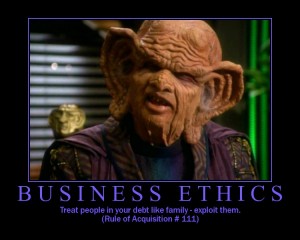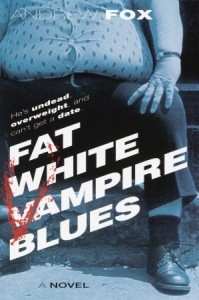The confluence this year of Independence Day, my wife and I starting our own small business (MonstraCity Press), and my coming across this article, called “Commerce and Art,” got me to thinking about my own field of the arts, science fiction, and how commerce, entrepreneurship, and business in general are portrayed. Also, knowing that authors often write what they know best, modeling their protagonists’ careers on their own day jobs, I began wondering whether the ongoing shift in the production of both physical books and ebooks from traditional, large publishing concerns to micro-firms controlled by the authors themselves would have any impact on the portrayal of merchants and commerce in science fiction.
First, I wanted to see what is out there currently. I turned to that crutch for the quick-and-dirty researcher, Google, and did some searches. It turns out that most portrayals of commerce and business in science fiction are of large corporations. And those portrayals, to put things bluntly, aren’t pretty. Near the top of the Google results, I came across lists of the Top Five Most Reprehensible Corporations in Science Fiction, the Ten Most Evil Corporations in Science Fiction, and Fifteen Evil Corporations in Science Fiction.
Noticing a theme? Here’s a revealing quote from the first of these lists which neatly sums up their content: “From an early age, we science fiction nerds have been taught that all corporate entities, regardless of size or field of interest, are inherently evil and seek only to make the lives of the little people more and more miserable.” An article called “Corporations in Science Fiction” makes this similar observation:
“Whether describing a society in which governments have been replaced by greedy megacorporations, or one in which each individual is required to be incorporated at birth, science fiction has overwhelmingly tended to cast business as the villain.”
Were there any corresponding lists of positive (or at least non-evil) portrayals of businesses, businesspeople, or entrepreneurs in science fiction? I couldn’t find any. So I decided to perform a little experiment with a relatively brief survey of the field I had at hand, 100 Must-Read Science Fiction Novels, a list compiled by Stephen E. Andrews and Nick Rennison published in Britain in 2006. This minute book was handy for my purposes because it gives plot summaries and overall reviews for a hundred prominent science fiction novels, dating from Mary Shelley’s Frankenstein, or the Modern Prometheus to almost the present day.
I went looking for examples of prominent SF novels whose protagonists were businesspeople or entrepreneurs, especially curious to see if any were shown in a positive light. I found four. Barrington J. Bayley’s The Garments of Caen (1976) features a hero who is a tailor and entrepreneur in a galaxy where couture influences the destinies of worlds. Michael Bishop’s Ancient of Days (1985) centers on sympathetic restaurant owner Paul Lloyd, who becomes involved in a menage a trois with a specimen of Homo Habilis. The alien protagonist of Walter Tevis’ The Man Who Fell to Earth (1963) acts as a benevolent inventor and business owner while trapped on Earth and attempting to send water back to his parched planet. Bob Shaw’s Other Days, Other Eyes (1972) offers up the most intriguing example of a scientific entrepreneur on this brief list: Alban Garrod, who inadvertently invents slow glass, patents it, and then watches as his invention and resulting products change the world. Alfred Bester’s The Demolished Man (1952) does center on a protagonist who is the owner and CEO of a large corporation, Ben Reich, but Reich is a murderer and an antihero, so I can’t count this one as a positive portrayal.
I did a bit more digging and came up with a tiny handful of other positive portrayals of merchants or businesspeople in SF. A. E. van Vogt gave us the weapons makers and sellers of The Weapons Shops of Isher, who function as a counterbalance to that world’s government. Poul Anderson provided us with Nicholas van Rijn, a flamboyant Dutch capitalist adventurer who stars in Anderson’s series of Technic History novels. The hero of George Alec Effinger’s Budayeen trilogy, which is set in a future Islamic caliphate, is a fixer for a local gangster but also owns a club, where much of the novels’ action takes place. F. Paul Wilson’s popular Repairman Jack character can be seen as a sort of entrepreneurial small businessman, specializing in assisting customers with resolving problems of a supernatural or otherworldly sort (although the Repairman Jack books are more properly categorized as horror, rather than SF).
Very early, pre-Amazing Stories science fiction often focused on inventor-entrepreneurs as heroes. Thomas Edison himself is featured as the hero of Edison’s Conquest of Mars (1898) by Garrett P. Serviss. Young inventor Tom Swift, created by Edward Stratemeyer, was the hero of more than a hundred juvenile novels by ghostwriters writing under the pseudonym Victor Appleton, published beginning in 1910. But Big Science, by the 1930s (and the beginnings of science fiction’s Golden Age), had passed the stage of the individual inventor/science entrepreneur and moved on to the realm of large corporations, governmental bureaus, and universities. So the engineer heroes of the Campbellian Golden Age were usually portrayed as the employees of large concerns, rather than as individual economic actors.
Still, by the 1950s, the science fiction published in Galaxy and The Magazine of Science Fiction and Fantasy had begun focusing on sociology, social psychology, and economics as types of scientific knowledge to be extrapolated. Commerce, the production of goods and the trading of those goods, is a basic human activity, present in one form or another in all human societies operating beyond a hunting and gathering stage. One might expect the number of stories and novels focusing on extrapolations of commerce would at least approximate the numbers of stories and novels featuring extrapolations of other basic societal and human functions, such as education, governance, diplomacy, reproduction, warfare, parenthood, and the arts. But aside from The Space Merchants and the almost entirely negative portrayals of large corporations alluded to above, there is surprisingly little in the SF canon.
Eric S. Raymond offers an explanation of why this is so is an article entitled “A Political History of SF.” He postulates that Campbellian Hard SF, the type of science fiction published in Astounding Stories and Analog from the late 1930s through John W. Campbell’s death in 1971, formed the ur-SF that all subsequent literary movements in science fiction (he lists these as the works of the Futurians, followed by New Wave in the 1960s, cyberpunk in the 1980s, and Radical Hard SF in the 1990s and beyond) have been reactions against. He describes the outlook of Campbellian SF as essentially Libertarian: “…ornery and insistent individualism, veneration of the competent man, instinctive distrust of coercive social engineering and a rock-ribbed objectivism that values knowing how things work and treats all political ideologizing with suspicion.” Accordingly, as this outlook tended to view commerce with an approving or at least neutral eye, the reactionary movements in SF (which have produced the bulk of what is generally considered the SF canon since the mid-1950s) have viewed commerce and capitalism with suspicion, if not hostility.
I would add another hypothesis: that a condemnatory attitude toward commerce and businesspeople among many SF writers stems in great part from larger trends affecting all writers in America since the mid twentieth century, not only the writers of speculative fiction. SF had its start as a brand of commercial fiction in an era during which the great bulk of fiction produced and sold was both commercial and disposable – the era of the pulp magazines. From the 1950s forward, however, many leading SF writers chose to raise their sights higher and aim for producing art literature, or at least fiction which could be enjoyed by a thoughtful, educated, literate reading public, highbrow or at a minimum midbrow. Horace Gold, editor of Galaxy in the 1950s, sought to publish a magazine which would be the equivalent of a New Yorker sold several centuries hence. The writers who formed the New Wave sought to incorporate the stylistic innovations of the Modernists into science fiction. Since the 1970s, science fiction has become an acceptable topic of discourse on college campuses, and more and more SF writers have as their day jobs teaching at post-secondary schools, just as a sizable percentage of literary/mainstream/non-genre authors have made their primary livings as university teachers since the beginnings of what has been called the Program Era in American fiction, the rise to dominance in American literary publishing of the graduates of creative writing programs.
So a goodly part of the herd of SF writers may be walking the same paths as the larger, or at least higher-status, herd of mainstream fiction writers. Stephen Miller, in his recent article “Commerce and Art,” states:
“Disdain for commerce is what might be called a topos—a recurrent theme in Western literature. … There are sympathetic portraits of businessmen in novels by Abraham Cahan, Theodore Dreiser, F. Scott Fitzgerald, and Sinclair Lewis; yet after World War II, most American literary writers painted the business world in dark colors. In 1978, John Gardner complained that most contemporary American writers preached ‘a whining hatred of American business.’ … Jonathan Franzen takes the usual literary view of commerce. He argues that Edith Wharton ‘anticipates two … hallmarks of American society, the obliteration of all social distinctions by money and the hedonic treadmill of materialism.’”
Literary critic D. G. Myers has bemoaned the absence of meaningful, sympathetic portrayals of work in recent American literature. Nicole of the blog Bibliographing follows up on Myers’ comments by postulating that much of this absence of “real work” in American literature is due to the distance most American authors have maintained from any sorts of work apart from a limited number of white-collar professions:
“I suspect … that the professionalization of writing (especially of novel-writing) has diluted the presence of work in fiction, and what’s more, has denuded it of its variety. To some extent, this is a variant on the old complaint about ‘program fiction.’ If writers are ‘writers’ (and yes, I know many struggle and need to have day jobs to actually support themselves), if they go from BA to MFA to novel-writing, and if this is the new normal, and their peers all do the same, how much variety of experience outside a few professions are we now drawing on in contemporary fiction?
“I say ‘contemporary fiction’; I admit that I am largely thinking of a current New York–based literary scene that does, however, seem to dominate American letters at the moment. Not every character in these books is a writer, though they are often noted for their writer-narrators. But there is a fairly small circle of professions that are ‘acceptable,’ for lack of a better term, in contemporary fiction: writers, designers, journalists, perhaps lawyers and doctors, maybe a chef or two, professors, professors, professors, writers, writers… a ‘creative class,’ if you will.”
I’d like to add another point; that would be the influence of gatekeepers, particularly editors at large publishing houses, over what appears on those houses’ SF lists. Since the 1990s, the consolidation of publishing firms into sprawling corporate concerns (a number of which contain publishing arms as very minor portions of their overall business plans) has produced a publishing environment in which editors have shrinking amounts of influence over the publishing process, as opposed to that exercised by the denizens of the Marketing and Profit-and-Loss departments. Acquiring editors must “push” the books they favor through onerous layers of bureaucracy. Might not their own baleful experiences in their places of work, which chip away at their self-worth and make mockery of their early ambitions to work in the publishing industry, be reflected in their choices of manuscripts? Might not the prevalence of the trope of the “evil corporation” on the lists of Tor Books, Del Rey, Victor Gollancz, Bantam Spectra, et. al., be a gesture of “Screw the Man!” from an editorial corps whose members view themselves as white-collar cogs in a grinding corporate machine? If true, this wouldn’t surprise me.
And now we come to the biggest, most disruptive change in the publishing of science fiction since the popularization of mass-market paperback books and the death of the pulp magazines – the emergence of ebooks, print-on-demand books, and an easily and widely accessed electronic infrastructure for the sales of such items. A major mode of production and distribution of written works is now in the hands of writers themselves. Many SF and fantasy writers who launched their careers publishing the traditional way will want to continue having their books put out by the big houses. But more and more will find themselves with no choice but to take up the reins of publishing, marketing, and distribution themselves, as the shrinking number of large houses purge their lists of mid-list authors and begin concentrating solely on that small stable of writers who can reliably produce bestsellers.
Writers have always been small businesspeople: contractors who produce novels, stories, and scripts for other businesspeople to distribute to the reading/viewing audience. But many writers have not seen themselves in this role, instead seeing themselves as employees of publishing houses (or even, as literary agents have taken over editorial responsibilities formerly exercised by editors at publishing houses, as employees of their own agents). Many writers I’ve known (and I count myself as formerly among this number) prefer a world in which they are only responsible for the creation of texts, wherein all the other responsibilities inherent in publishing – editing, cover design, production, finding and nurturing an audience – are the tasks of other people. But for more and more of us, that world is no longer an option.
And maybe that’s not such a bad thing.
Being forced to take up the reins of publishing means being forced out (kicking and screaming, possibly) into the broader world of commerce. This can be an eye-opening experience, one which challenges many previously held beliefs and assumptions. One story along these lines which I really appreciate is the story of former Minnesota Senator and presidential candidate George McGovern. After his retirement from the Senate, Senator McGovern decided to purchase an inn in rural Connecticut, the Stratford Inn. He wrote very honestly about his experiences as a business owner. The difficulties of complying with a tangle of federal, state, and local regulations drove him into bankruptcy and forced him to close his business. He writes:
“Calvin Coolidge was too simplistic when he observed that ‘the business of America is business.’ But like most sweeping political statements, even Coolidge’s contains some truth — enough, as I’ve learned, to make me wish I had known more firsthand about the concerns and problems of American businesspeople while I was a U.S. senator and later a presidential nominee. That knowledge would have made me a better legislator and a more worthy aspirant to the White House. … (L)egislators and government regulators must more carefully consider the economic and management burdens we have been imposing on U.S. business. … I’m for protecting the health and well-being of both workers and consumers. I’m for a clean environment and economic justice. But I’m convinced we can pursue those worthy goals and still cut down vastly on the incredible paperwork, the complicated tax forms, the number of minute regulations, and the seemingly endless reporting requirements that afflict American business. Many businesses, especially small independents such as the Stratford Inn, simply can’t pass such costs on to their customers and remain competitive or profitable. … I do know that if I were back in the U.S. Senate or in the White House, I would ask a lot of questions before I voted for any more burdens on the thousands of struggling businesses across the nation.”
Those are the word of a man whose experiences, late in his life, after he had already experienced a lifetime in politics at the highest levels (and as a tribune of the left wing of the Democratic Party), profoundly changed his thinking.
Just taking the first few steps in setting up a small business with my wife has exposed me to a whole world of activities with which I had no prior familiarity. Dara and I are both having to learn bucket loads of new skills, and learn them in a hurry. Many others have already walked this path ahead of us and have offered us the benefits of their experiences. Kristine Kathryn Rusch has written very eloquently about the emotional challenges a writer faces when he or she becomes his or her own boss. Sarah Hoyt is another interesting and independent-minded author who is currently straddling the worlds of traditional publishing (she has a good thing going with Baen Books and a history with several other major houses) and indie publishing (mostly short stories for now, but she is moving towards putting up more of her novels herself as ebooks and POD books). Others are pioneering news ways of building a career in speculative fiction. Cory Doctorow is an advocate for the liberalization of copyright laws and has published several of his books under Creative Commons license, as well as having some of his novels traditionally published by Tor Books. The husband and wife team of Jeff and Ann VanderMeer have operated their own small presses, Buzzcity Press and the Ministry of Whimsy Press, as well as packaged anthologies and coffee table books for other publishers, edited magazines, and published books with traditional large houses.
People learn by doing. Writers write what they have learned. Now that more and more science fiction writers are learning the skills required by small businesspeople, will at least some of the science fiction novels and stories of the future reflect a deeper insight into the psyches of merchants and the challenges posed by commerce? Twenty years from now, will it be just as easy to find online lists entitled “Ten Most Awesome Scientific Entrepreneurs in Science Fiction” or “Fifteen Heroic Businesspeople in SF” as it is to find “Top Five Most Reprehensible Corporations in Science Fiction”?
We shall see. We most definitely shall see.







